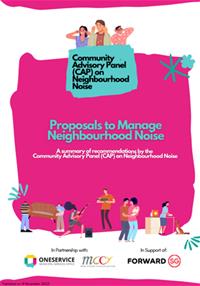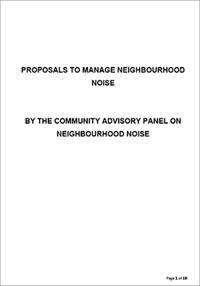About Community Advisory Panel on Neighbourhood Noise
Neighbourhood noise can be a complex issue and may be the cause of unhappiness between neighbours.
The setting up of a Community Advisory Panel (CAP) on Neighbourhood Noise was announced by Senior Minister of State for National Development, Ms Sim Ann, at the 2022 Committee of Supply Debate on 8 March 2022.
The Panel was convened to define what are deemed as unacceptable noise disturbances and what constitute good community norms that residents should observe to reduce noise disturbances to their neighbours. In particular, the CAP looked at noise from neighbours and congregational noise in common areas.
The CAP conducted extensive consultation with the public in the course of developing the proposed community norms and submitted a report with their recommendations on Nov 2022. MSO is reviewing their recommendations.
CAP's Report on Neighbourhood Noise
CAP has proposed the following norms:
i. Resolve issues with neighbours through informal discussions and relationship building, instead of approaching the authorities to intervene in the first instance;
ii. Adhere to the quiet hours, which CAP recommended to be extended to between 10pm to 8am; and
iii. Practise considerate behaviours to create a peaceful and harmonious living environment within and outside the quiet hours.
The report also highlighted that community norms alone were insufficient to manage the issue of neighbourhood noise. Hence, the Panel has recommended for the Government to review the process to manage disputes over community noise, appropriately and efficaciously supported by enforcement powers. Please refer to the reports below (click on the images to find out more).
Recommendation Summary Infographics
by CAP
 |
Full Recommendation Report
by CAP

|
CAP would like to thank the members of the public who have contributed to this report by sharing their experiences with us. Your views and perspectives have helped guide the Panel in their deliberation of a set of norms for the community. While the Panel is unable to cover the needs of every individual, we hope that our recommendations will address the crux of the noise issue and lead to a better overall outcome for the community.
Community Norms on Neighbourhood Noise
Neighbourhood noise can be broken down into two main categories:
a. Noise from neighbours, which refers to noise from neighbouring units, such as from gatherings, furniture dragging and DIY renovation.
b. Congregational noise, which refers to noises created from people gathering in residential common areas, such as void decks, playgrounds and exercise areas.
Neighbourhood noise is inevitable in a densely populated country like Singapore. However, the issue is worsened when there is a lack of consideration or communication between neighbours. The noise generated can disturb work, study or rest time of neighbours, and have a negative impact on their lives.
As part of an integrated response to mitigate neighbourhood noise, the Panel has recommended a set of community norms with an acceptable set of best practices that residents should abide by to minimise noise levels. Practising consideration for each other, based on a shared set of norms, is important for creating a harmonious and considerate living environment for everyone.
General
|
|
Respect the quiet hours (10.30pm to 7am) when you are at home or in a residential area.
|
|
When gathering in common areas such as playgrounds or coffeeshops, minimise noise especially during quiet hours.
|
Renovation-related
|
|
Work on your DIY projects during the daytime and try to complete them within a short timeframe if possible.
|
|
Keep your neighbours in mind and noises under control! Use items to soundproof the room or absorb the noise during the renovation.
|
|
Seek your neighbours’ understanding by informing them in advance of your renovation works.
|
|
Avoid DIY renovations during quiet hours.
|
Movement-related
|
|
Gentle on the floor, gentle on our ears! Lift your furniture, if possible, when moving it. If it is too heavy to be lifted, use items such as furniture sliders to absorb the noise.
|
|
Using exercise mats to absorb the noise will lead to a more comfortable workout environment for everyone.
|
|
Using door stoppers will prevent accidental slamming of doors.
|
Activity-related
|
|
Avoid playing musical instruments during quiet hours.
|
|
Lower your TV volume and use headphones for gaming activities.
|
|
If your child is playing, teach them to be mindful of noise levels. Monitor their noise levels and ask them to quieten down particularly during quiet hours.
|
|
Place play mats to cushion noise from stomping, jumping, and slamming of toys on the floor.
|
|
Keep the entertainment within your unit! Close your windows and doors to prevent noise from affecting others.
|
|
Avoid noisy gatherings during quiet hours.
|
Pets-related
|
|
Try to move your pets to an enclosed room if they are making excessive noise.
|
|
Train your pets to avoid excessive noise from them and seek professional assistance if needed.
|
|
For bird owners, cover your birdcages in the evening to allow your birds time to rest.
|
Click here for more resources.